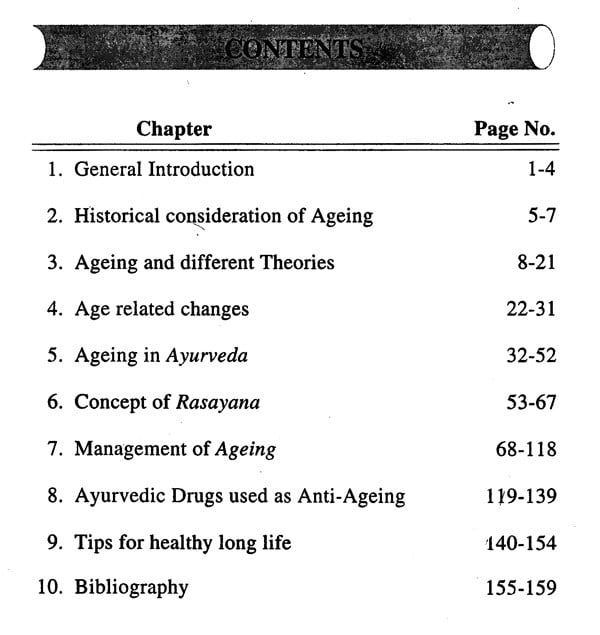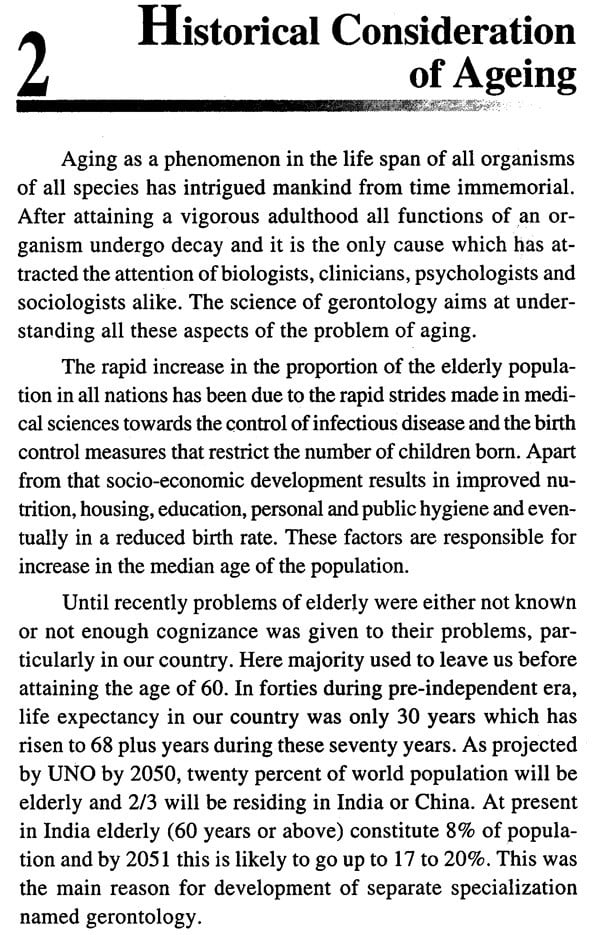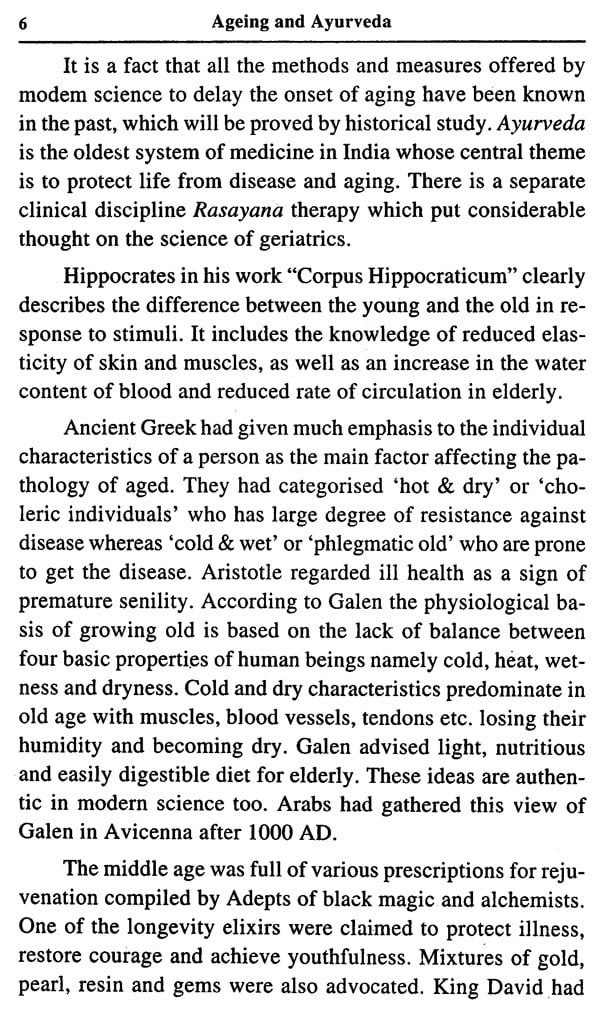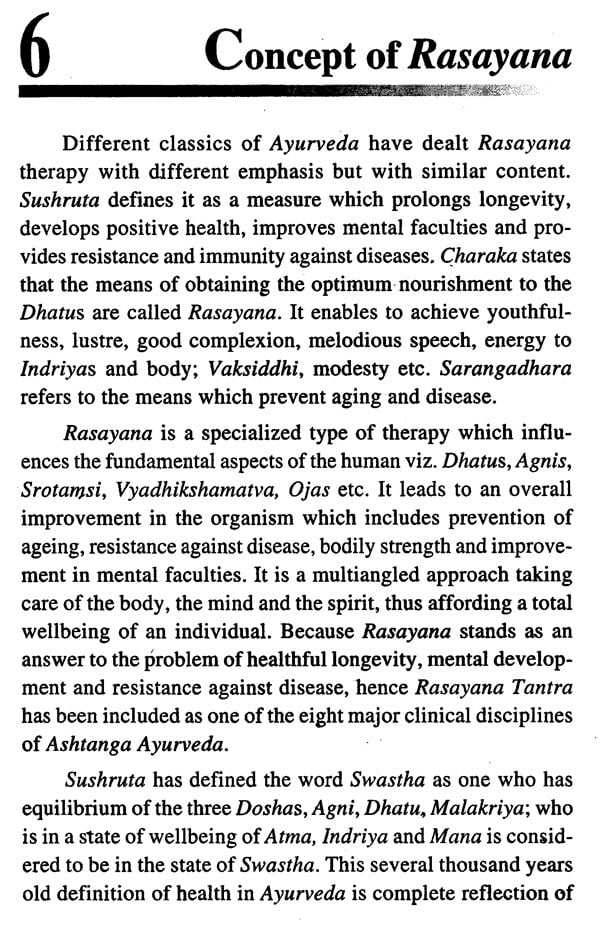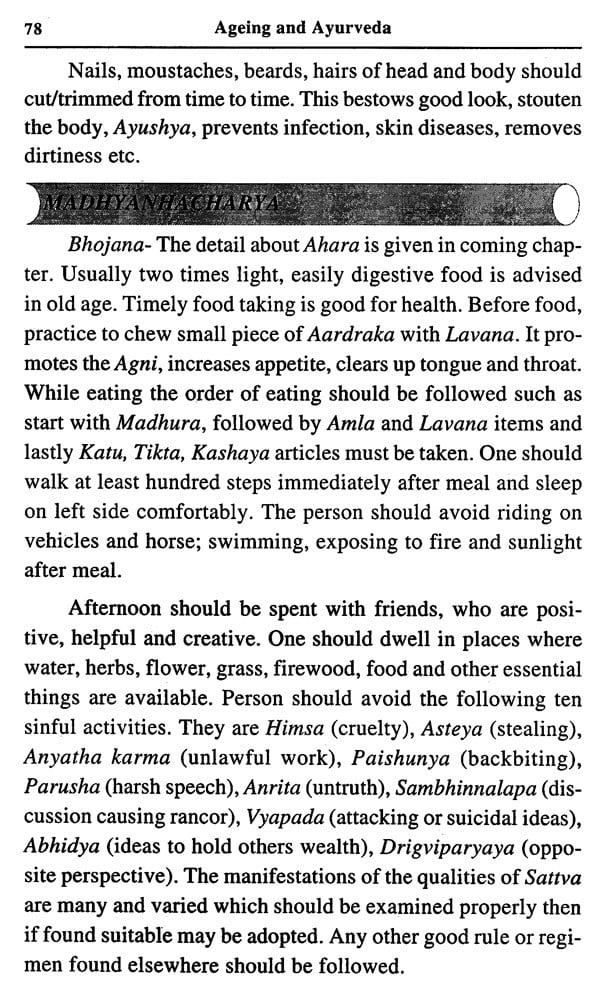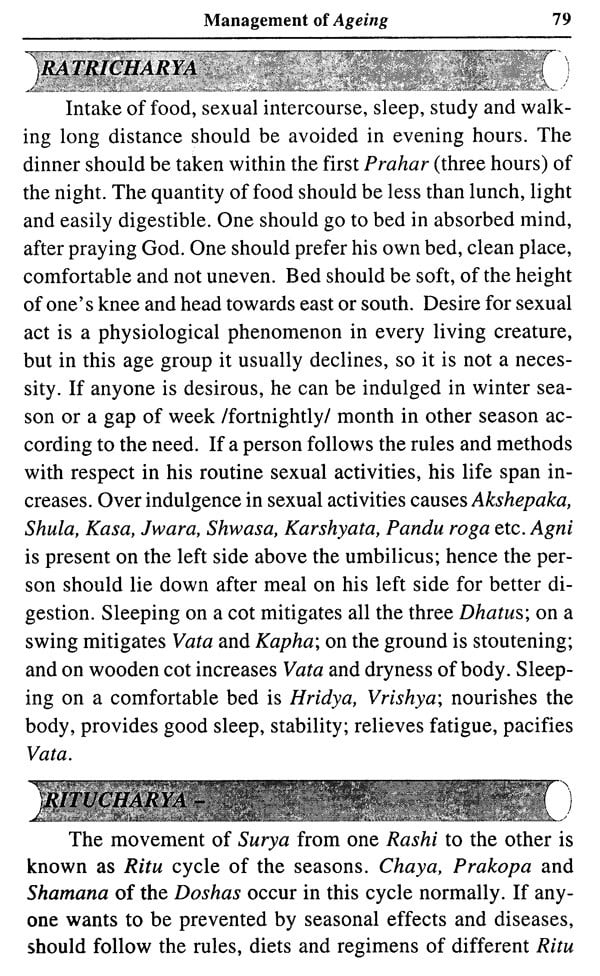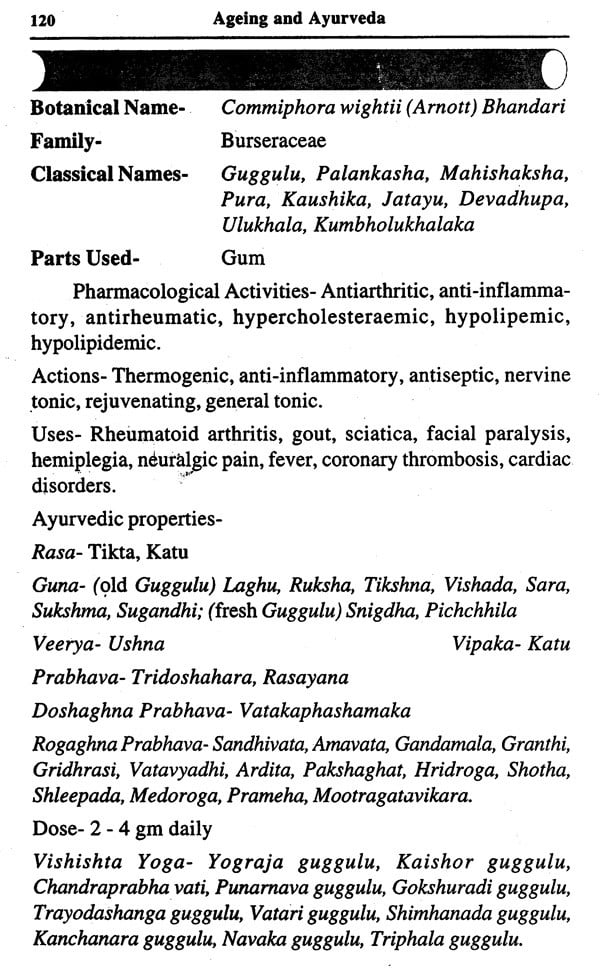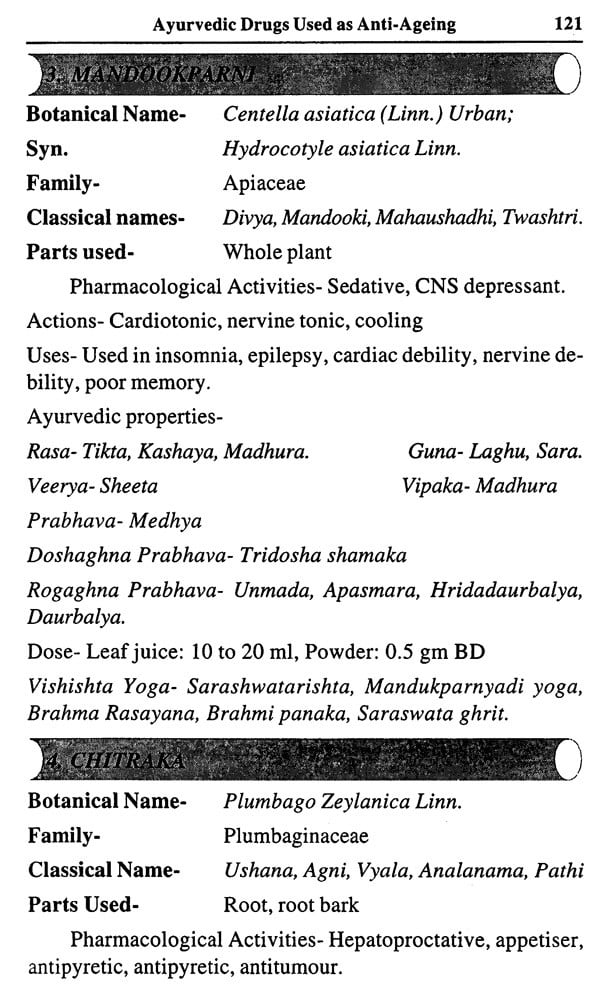
Ageing and Ayurveda
Book Specification
| Item Code: | NBZ702 |
| Author: | K. K. Dwivedi |
| Publisher: | CHAUKHAMBHA ORIENTALIA, Varanasi |
| Language: | English |
| Edition: | 2020 |
| ISBN: | 9789390777006 |
| Pages: | 158 |
| Cover: | HARDCOVER |
| Other Details | 9.00 X 5.50 inch |
| Weight | 350 gm |
Book Description
Ageing and its related problems are the most important health issues of present-day society. It is an inevitable process and everyone wants a long healthy life. Ageing can be retarded through Ayurvedic approach of lifestyle and management. Ayurveda is a holistic system of health care which can contribute to geriatric care in a safe and effective manner. This book will provide detail about ancient concept, prevention, promotion and management of ageing.
This book 'Ageing and Ayurveda' is an effort to detail explanation of the subject not only for the Ayurveda fraternity but for other system of health care person including common people.
Vd. Kamlesh Kumar Dwivedi has completed his B.A.M.S from G.A.C., S.S. University, Varanasi with distinction. Did M.D. Ayurveda and Ph.D from Deptt. of Kayachikitsa, Faculty of Ayurveda, B.H.U., Varanasi under Padmashree Prof. Ram Harsh Singh, Distinguished Professor, B.H.U. and former Vice-Chancellor, SRKRAU, Jodhpur. He has Diploma in Yoga, P.G.D.H.A. and P.G.D.G.C. He has worked as Junior Research Fellow, Senior Research Fellow, Clinical Registrar, Senior Resident in Banaras Hindu University.
Vd. Dwivedi has guided more than 15 M.D. Ay. and Ph. D. scholars, published 45 articles, editor of six Journals and mentor of thousand students. Contributed Chapters in half dozen Book and wrote two books. Awarded by several awards such as Hari Om Ashram Gold Medal, Best Teacher Award, Life Time Achievement Award, Yoga Ratna Award, Kashi Ratna Award etc. He is ex CCIM member and presently Member, Board of Governors, CCIM, Ministry of AYUSH, Govt. of India. At present working as Reader and Head, Deptt. of Kayachikitsa, Govt. P.G. Ayurveda College, S.S. University, Varanasi.
Ayurveda essentially being the science of life and longevity, geriatric health care is one of its prime concern. The life is a time bound phenomenon. The man borns, grows to adulthood, passes to senility and dies. Prayer in Veda Jivema Shardah Shatam, Pashyem Shardah Shatam' is an example that long healthy life is the most cherished wish of man since antiquity.
India is an ancient and a vast cultural, spiritual, religious and anthropological laboratory. Its scriptures prescribe a life span of 100 years with due activity and vigour. In ancient Indian traditions man's life is demarcated into four stages (Ashramas), the first one of the studentship (Brahmacharya) followed successively by those of a householder (Grihastha), a forest dweller (Vanaprastha) and an ascetic (Sanyasa). The last two are for the elderly. They are to get off themselves of economic, domestic and other responsibilities. This is to enable them to turn for society's welfare and also for a spiritual life.
The number of the aged has steadily increased all over the world in this century. Scientists stated that India like other developing countries is passing through the so-called second stage of demographic transition, with high fertility and low mortality from the first stage of high fertility and high mortality. With increasing adoption of family planning methods and a higher age of marriage, the next dedades may see the country in the third stage of this transition, namely low fertility and low mortality resulting in increased numbers in the elderly. India several years ago, a country of young population presently is passing through the stage of mature population and perhaps in years to come will find herself as the aged population in the company of the advanced countries.
Ranking second in terms of population and seventh in terms of area, India supports 15 percent of the world's population. Those aged 60 and above constitute 8 percent of country's population, numbering around 108 million. Generally, three-fourths of India's geriatric population is 'young-old' (between 60-70 years) and the rest `old-old' (over 70 years) the grandparents and great grandparents' categories respectively.
The advancing age of man brings its own specific problems to be dealt with. There is a gradually progressive decline in co-ordination, energy reserves, muscular strength, resistance to illness, stress tolerance and ability to recover from illness. Increasing cholesterol deposit in blood vessels narrow vascular lumen with decreased blood supply to the brain resulting in cerebral atrophy and apoplexy. In this age bones develop osteoporosis, joints get fibroses, skin becomes wrinkled, loose its elasticity, muscle atrophies, hair become thinner and grey. Reduced blood supply in brain is reflected in physiological changes viz., reduced memory, inability to learn, lowered ability to integrate new information and to organize appropriate responses, a decreased flexibility and creativity in problem solving, lowered capacity to cope with psychological stresses, an increase in time required for various psychomotor tasks. Reduced income, increase in leisure, changing attitude of younger generation (generation gap), retirement from work etc. add to the stresses and pose new demands for adjustment for the individual. All this tends to produce anxiety, depression, despair, feeling of uselessness etc.
Physical ailments of old age like myocardial infarction, hypertension, diabetes mellitus, neoplasms and other diseases are associated with their own specific physical and psychiatric problems. Changing physiology,metabolism and pharmacokinetics with ageing requires greater skill and close monitoring of physiological functions in drug treatment. Conjoint efforts of workers of multiple disciplines are essential for the proper study of this growing entity. In this age of narrow specialization, a holistic approach to the study of health problems of the elderly is unlikely to thrive. Increasing attention is being given to research efforts for identifying etiological factors, developing clinical and psychiatric tools and finding useful therapeutic agents and programmes for these patients.
Geriatrics is a comparatively newer discipline of modern medicine. Though the problem of old age and treatment were recognized as early as the time of Hippocrates, the subject came to be recognized as a speciality only recently. Now with the advancement of scientific knowledge in every field, the science of gerontology too has enjoyed great development including identification of different branches like gerocardiology, geropsychiatry etc.
Probably the science of life was first practised by Ayurvedic school of medicine. Protection of life from disease and ageing is its main theme. Ayurveda puts a considerable thought on the science of gerontology through Rasayana tantra, which is a comprehensive clinical discipline. As evident from the fundamental statement of Charaka i.e. Labhopayo hi shastanam rasadinam Rasayanam' Rasayana therapy affords a comprehensive physiologic, metabolic and psychologic restoration of a person. Rasayana is primarily a Jaravinashana and secondarily Vyadhivinashana as defined by Sharangadhara - 'Rasayanam cha tajjeyam yatjara-vyadhinashanam' . The term Rasayana does not only refer to a drug or therapy, but to a discipline which may of course include a therapy. So, it is evident that Ayurveda considers the phenomenon of aging from a broader and new angle. Rasayana drugs are supposed to be potential for prevention of aging, improvement of mental faculties and development of body resistance.
**Contents and Sample Pages**
